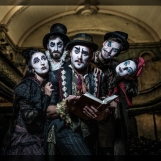Theatre History & Historiography 2018
Full Name: Lucie Sutherland
Annual Conference Theme (if applicable): Industry Professionals/Professional Industry: Distinctions and Divisions
What were the main points that emerged from your WG this year?
This theme followed on from our work at Salford last year where we focused upon the concepts of industry and work within the theatre/performance profession. Two distinctions regularly emerged: between amateur and professional theatre makers, and between metropolitan and regional theatre making. This suggested an enduring preoccupation with ‘centre versus the middle’ thinking in theatre history and historiography, and resulted in our theme for this year. In response to our call we accepted a number of papers dealing with subjects ranging from metropolitan performance practice rearticulated in regional and suburban environments, to issues of diversity and authority in relation to gender and age, on historical London stages. This range of papers remained linked by a concern with axioms of power, and the related exclusion or erasure of some individuals and some practice in both professional and amateur theatre and performance. This led directly to our discussions of how we might follow on in our conference theme next year, to build on the papers and our discussions (outlined further under business meeting information, below).
Since the concepts of industry and professionalism have been central to our working group for the last two years, a second strand to our working group activities at the conference was the ‘Industry Practices’ strand that we added to each session, giving peers a chance to reflect and to report on key subjects and issues that we need to engage with as academics. This strand included: ‘External Partnerships’, ‘Research Collaboration’, ‘Authorship and the Age of Impact’, ‘Funding’ and ‘Publishing’. Both in the business meeting and in informal conversations, it was made clear to the convenors that these opportunities to reflect on our own professional practice had been welcome.
What was discussed at your business meeting?
Within the business meeting, we sought feedback on two key initiatives this year: the use of the ongoing ‘Industry Professionals/Professional Industry’ thread, and the use of the ‘Industry Practices’ strand. The general consensus of those who could be present for the meeting, was that these had provided space to think about important aspects of our work, and had also ensured some continuity in discussion across the year. This was particularly welcome because we took the decision to hold no formal interim event, but instead, to plan for a one-day interim next year, responding at least in part to our recent theme. There was some discussion of the interim, and how work with a practitioner would be a valuable part of the day, as many of us do collaborate with theatre professionals and/or do engage in practice as research, as theatre historians. We will be continuing our discussions with the group by email, to consolidate ideas for the interim event, in the months ahead.
We discussed a range of potential themes for the conference next year, and will continue to discuss these with the working group by email before confirming. These include: ‘Exclusion, erasure and erosion’; ‘Recovery, repositioning and remembering’; ‘Axioms of power: creative power, people power, industry power’; ‘Soft power/soft play’; ‘Collaboration’; ‘Trends in historiography’; ‘Class’; ‘Qualitative and quantitative metrics/value systems’; ‘Emotional and intellectual labour’; ‘Legacy and genealogy’. We are also considering a theme in response to Brexit, as this subject seemed to be emerging from some papers this year.
We also discussed publications; given the ‘joined up’ nature of our conference themes over the last two years, it is worth continuing our conversations about the feasibility of an edited collection, and we will continue to explore this possibility over the next year.
We also asked for volunteer readers for the TaPRA prizes during the meeting.
Nothing was raised under AOB.
Types of contributions:
3 or 4 x 15 minute papers per session, plus one x 10 minute ‘Industry Practices’ provocation.
Number of formal contributors (those listed in book of abstracts) Including ‘Industry Practices’ participants, we had 24 contributors scheduled, with 1 person unable to attend in the end so 23 contributors.
Approx. overall number of delegates who attended your WG Sessions Session1: 28; Session 2: 25; Session 3: 32; Session 4: 18; Open Panel: 29
Composition of WG (PG, ECR, etc.)
Estimated c. 4 PGs and c. 10 ECRs, with the rest of the participants and attendees spread across later stages of career.
Did you have any non-UK participants? No
If your WG hosted an Open Panel, do you have any feedback?
Our open panel session seemed to be well scheduled and to attract some from beyond our working group; although the numbers were roughly in line with our other sessions, there were some new faces in the room. We put together a panel looking at a range of subjects, from alternative theatres of the First World War, to stagings of Hull during the city’s tenure as City of Culture (2017). The papers both related to our interest in distinctions and divisions, and showcased the range of work undertaken by members of the History & Historiography working group.
Any additional points or feedback not covered above?
Just to note that in terms of attendance/participation in working groups, the convenors made a request to the Exec (via the Working Group Coordinator) that future CFPs have an additional statement to highlight the ‘community’ nature of the working groups and the intention/design to facilitate ongoing discussions therefore while individuals may move around working groups ideally they should also participate in the one in which they deliver their paper.

